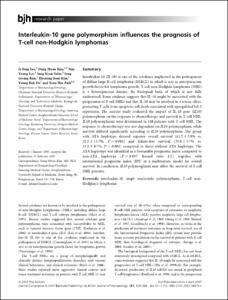KUMEL Repository
1. Journal Papers (연구논문)
1. School of Medicine (의과대학)
Dept. of Internal Medicine (내과학)
Interleukin-10 gene polymorphism influences the prognosis of T-cell non-Hodgkin lymphomas
- Keimyung Author(s)
- Do, Young Rok
- Department
- Dept. of Internal Medicine (내과학)
- Journal Title
- British Journal of Haematology
- Issued Date
- 2007
- Volume
- 137
- Issue
- 4
- Abstract
- Interleukin-10 (IL-10) is one of the cytokines implicated in the pathogenesis of diffuse large B-cell lymphoma (DLBCL) in which it acts as auto/paracrine growth factor for lymphoma growth. T-cell non-Hodgkin lymphoma (NHL) is a heterogeneous disease, the biological basis of which is not fully understood. Some evidence suggests that IL-10 might be associated with the progression of T-cell NHLs and that IL-10 may be involved in a rescue effect, protecting T cells from apoptotic cell death associated with upregulated bcl-2 expression. The current study evaluated the impact of IL-10 gene (IL10) polymorphism on the response to chemotherapy and survival in T-cell NHL. IL10 polymorphisms were determined in 108 patients with T-cell NHL. The response to chemotherapy was not dependent on IL10 polymorphism, while survival differed significantly according to IL10 polymorphism. The group with ATA haplotype showed superior overall survival (61·2 ± 5·9% vs. 21·2 ± 11·7%, P = 0·001) and failure-free survival (35·0 ± 5·7% vs. 13·2 ± 8·7%, P = 0·001) compared to those without ATA haplotype. The ATA haplotype was identified as a favourable prognostic factor compared to non-ATA haplotype (P = 0·037, hazard ratio 2·1), together with international prognostic index (IPI) in a multivariate model for overall survival. In conclusion, IL10 polymorphism may affect the survival of T-cell NHL patients.
- Keimyung Author(s)(Kor)
- 도영록
- Publisher
- School of Medicine
- Citation
- Je-Jung Lee et al. (2007). Interleukin-10 gene polymorphism influences the prognosis of T-cell non-Hodgkin lymphomas. British Journal of Haematology, 137(4), 329–336. doi: 10.1111/j.1365-2141.2007.06570.x
- Type
- Article
- ISSN
- 0007-1048
- Appears in Collections:
- 1. School of Medicine (의과대학) > Dept. of Internal Medicine (내과학)
- 파일 목록
-
-
Download
 oak-aaa-00705.pdf
기타 데이터 / 529.48 kB / Adobe PDF
oak-aaa-00705.pdf
기타 데이터 / 529.48 kB / Adobe PDF
-
Items in Repository are protected by copyright, with all rights reserved, unless otherwise indicated.